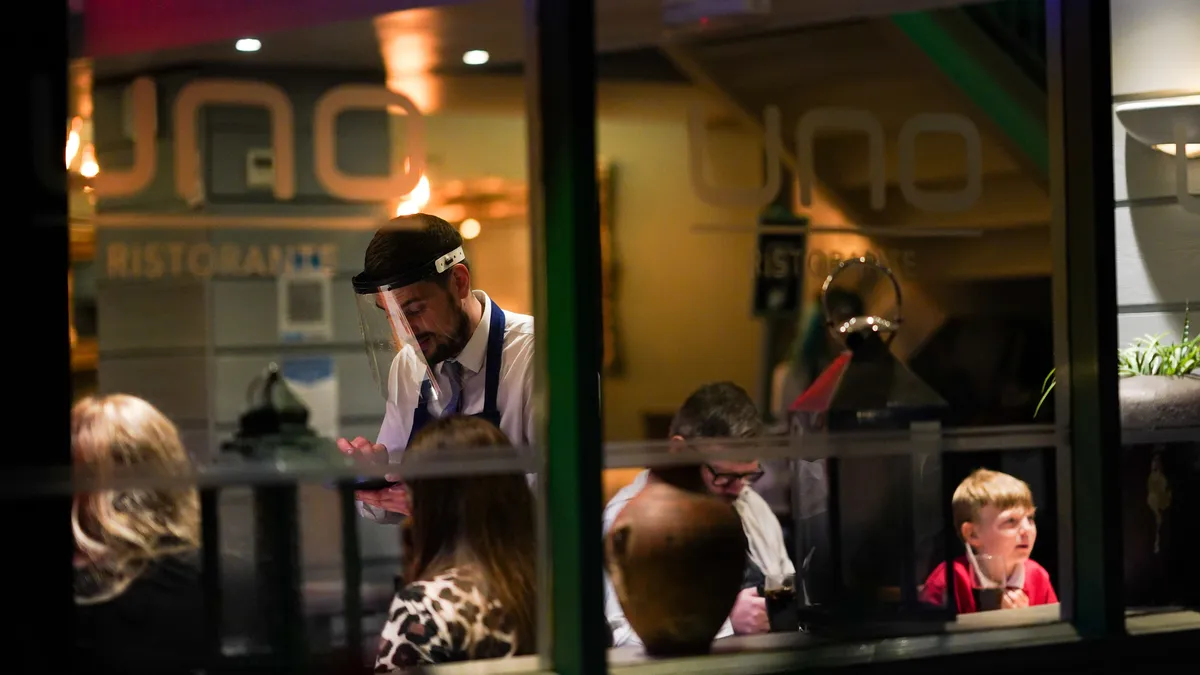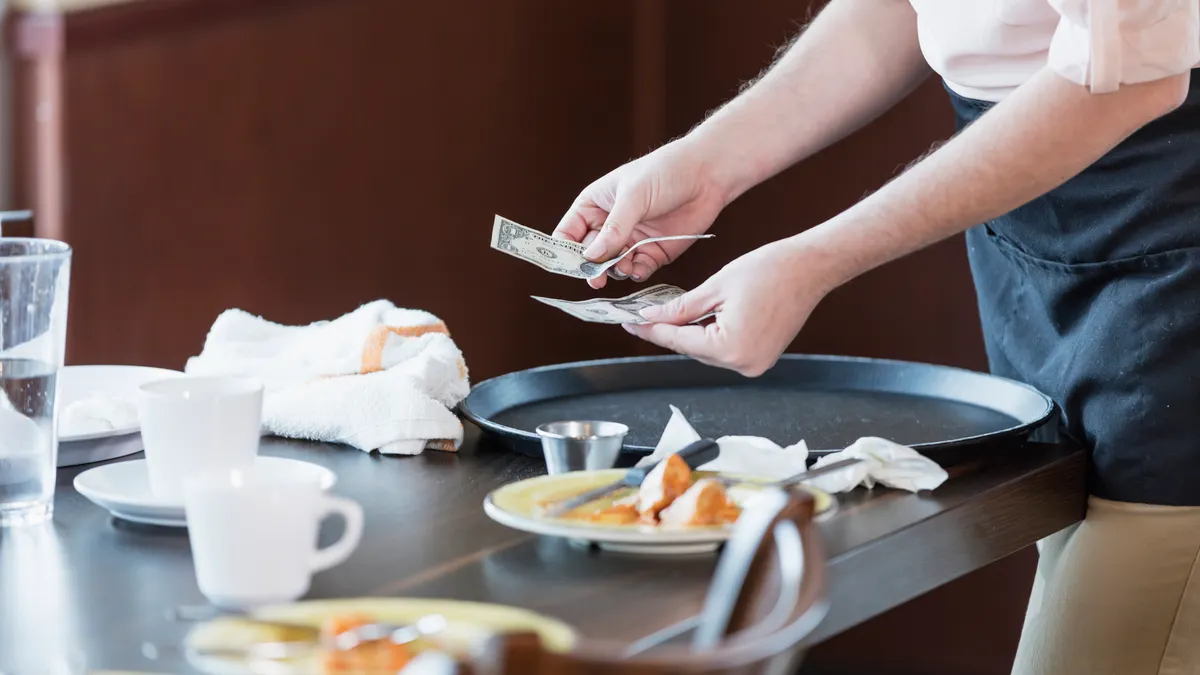After former Gov. Andrew Cuomo's fall from grace, New York's restaurant industry has a new leader directing policy for operators and workers in the pandemic: Gov. Kathy Hochul.
Hochul, who was sworn in during a private ceremony Tuesday, is the Empire State's first female governor and once worked as a waitress — an attribute that One Fair Wage President Saru Jayaraman hopes will make her sympathetic to the group's call for an end to the subminimum wage in the state.
By paying restaurant staff a $15 minimum wage plus tips, Hochul would ease both labor struggles for New York restaurants and sexual harassment for tipped women workers, Jayaraman argues.
"So many women during the pandemic told us they were asked repeatedly, 'Take off your mask so I can see how cute you are before I decide how much to tip you,'" Jayaraman said. "And so women are like, 'Wait a second, you want me to expose myself and my family to the virus for minimum wage, for just for the chance to get this tip?' It's just not worth it anymore."
Restaurant wages are already rising in a bid to attract and retain restaurant workers, but not all industry associations feel that the restaurant industry is currently strong enough to absorb the costs that come with raising pay.
Sean Kennedy, EVP of public affairs for the National Restaurant Association, wrote in a recent guest post for Restaurant Dive that the Raise the Wage Act — which would eliminate the tip credit and increase the U.S. minimum wage to $15 over four years — is "the wrong proposal at the wrong time," for example. Kennedy argues that such a move would destabilize restaurants "questioning if they can survive another month" and hurt restaurant employees "relying on the local minimum wage and their tips to weather the economic storm."
But Jayaraman is adamant wage hikes are necessary for the industry's longevity. She also feels that as a governor coming in on the heels of a sexual harassment crisis, Hochul must address the sexual harassment that pervades tipped work, Jayaraman said.
"Cuomo's transgressions with regards to sexual harassment were not just the indiviudals he harassed, but the 400,000 women he left to harassment in the restaurant industry by committing [to end the subminimum wage] and then never doing it," she said. "[Hochul] has to [end the subminum wage] to address sexual harassment, to clean up what Cuomo didn't do and to get this industry back to work. There's no other way."
Jayaraman shared her vision for how she hopes Hochul will shape policy to protect restaurant workers in a recent interview with Restaurant Dive.
This interview has been edited for clarity and brevity.
RESTAURANT DIVE: How do you think Gov. Kathy Hochul could impact policy for restaurant workers in New York?
SARU JAYARAMAN: We've been working on ending the subminimum wage for tipped workers and allowing for tip sharing with back-of-house workers. And we've had not only bills moving on that for many years, but former Gov. Andrew Cuomo had committed to doing that at the end of 2017, and never did it. And finally at the end of 2019, he did it for all other tipped workers but not for the restaurant industry.
What's so dramatically changed is now we've got literally hundreds and hundreds of New York restaurant owners joining us in that call for that policy, because, frankly, so many of them have not been able to fully reopen and find staff.
Our data has shown eight out of 10 workers are saying they're thinking about leaving, and eight out of 10 say the only thing that would make them stay or come back to the industry is a full, livable wage with tips on top. And so we are really hoping that Gov. Hochul can do what Cuomo said he was going to do and did for other tipped workers, which is use her executive authority to end the subminimum wage for tipped workers and to allow for tip sharing with the back of the house.
We've also proposed that she could provide some additional supports — either tax credits or grants — to restaurants that want to move to the full wage more quickly. You do executive action that phases in the raising of the wage, but you could also provide some grant funding to restaurants that commit to just going to $15 per hour immediately.
I was just looking at a quote from one of our restaurant owners, who said we desperately need the government to do this as policy to create a level playing field because if everybody has to raise wages individually, it creates hardship for smaller businesses. Together, it's much better.
We also need it because only the government has the platform to tell literally hundreds of thousands of New York workers, "Come back. It's worth working in restaurants. This is permanent change, not a temporary signing bonus. We understand your worth, and it's worth working in restaurants."
That transition to a $15 wage would be especially challenging without more federal support for the restaurant industry.
That's right. If small businesses are raising wages across the board because they have to, they need Denny's, IHOP, Chili's and Applebee's to do so as well.
Some employers have told us "I've raised wages and I still can't get workers to come back." We tell them why, because we're hearing from the workers, which is that workers last year really uprooted their lives to say, "Okay, I'm done. I can't make it work in this industry anymore. The tips are down, wages are too low. The sexual harassment and hostility is way up. And it's super dangerous."
A lot of people went back to school or went to another industry. And if you're going to try to get all those people to once again uproot their lives and turn around, if it's just one employer saying, "I'll raise my wages," it's hard to trust that that's permanent, especially with all the talk of temporary signing bonuses.
How can these workers trust that this is not just a wage change for now, and operators will go back to a lesser wage later? But if the government says, "No, the actual legal wage is changing," that's enough of a guarantee to get workers to come back to this industry.
We need make it worth working in restaurants again — or maybe for the first time, frankly. I think this huge light bulb went off for so many workers last year that tips are not reliable. And what comes with the tips is too much to ask.
Do you have a vision for what an ideal combination of policies, such as ending the subminimum wage and providing grants for restaurants that make this transition ahead of schedule, would look like?
One Fair Wage actually created this program during the pandemic with Gov. Gavin Newsom in California, Gov. Gretchen Whitmer in Michigan, Mayor Bill de Blasio in New York City, Boston Mayor Marty Walsh, who then became the Secretary of Labor, and Mayor Lori Lightfoot in Chicago. So in five states, we raised both public and private funding to provide grants to restaurants that commit to transitioning to a $15 minimum wage with tips on top and [commit to] going through our race and gender equity training program.
We did that with Mayor de Blasio and it ended up being close to a $3.5 million program in New York. And we awarded between 70 and 100 restaurants in New York City grants to do this.
And so what we are proposing for Hochul is to first enact an executive order that would phase in the subminimum wage for tipped workers in the restaurant industry to the full minumum wage over many years. Secondly, for restaurants that want to go there now or feel like they have to to get workers back to work, she could provide some grant funding.
And that grant funding would be tied to restaurants committing to the higher wage immediately and going through this equity training program. There's a lot of precedent for this — we've done it at the city level, we've done it with other governors. We definitely need the law to change and the we can add the support.
We got a bill passed in Congress in 2018 that says if you pay the full minimum wage, you can share tips with the back of house. That's how it's done in California and in the seven states that already pay one fair wage. But New York and Massachusetts are the only two states where even if you do pay the full minimum wage, you can't share tips with the back of the house.
So we're asking Hochul to pass an executive order that would also allow for tip sharing with back-of-house workers.
Is One Fair Wage optimistic that Hochul will enact these changes?
We're very hopeful. We feel like she gets it as a former tipped worker and has a real opportunity to do things that are going to work for both employers and workers, because there's just no way to move forward otherwise.
I think we have two choices as an industry. We can either raise the wage or shrink the industry. Workers are not going to come back in the numbers that they did before.





















